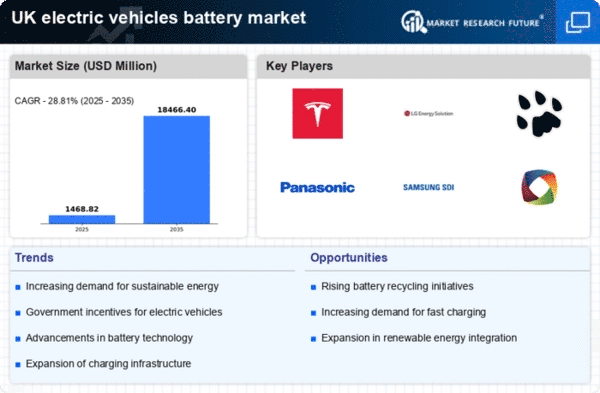Investment in Renewable Energy Sources
The electric vehicles-battery market is likely to benefit from increased investment in renewable energy sources. As the UK transitions towards a greener energy grid, the integration of renewable energy into the charging infrastructure for EVs is becoming more prevalent. This shift is expected to enhance the sustainability of electric vehicles, making them more appealing to environmentally conscious consumers. The UK government has set ambitious targets for renewable energy, aiming for 70% of electricity generation to come from renewable sources by 2030. This transition not only supports the electric vehicles-battery market but also aligns with broader climate goals, potentially leading to a more robust and resilient market.
Development of Smart Charging Solutions
The electric vehicles-battery market is being influenced by the development of smart charging solutions. These technologies enable more efficient energy management, allowing EVs to charge during off-peak hours when electricity is cheaper and more abundant. In the UK, the implementation of smart charging infrastructure is expected to grow significantly, with projections indicating a 40% increase in smart charging points by 2027. This development not only enhances the convenience for EV users but also supports grid stability and reduces energy costs. As smart charging solutions become more widespread, they are likely to play a crucial role in the growth of the electric vehicles-battery market.
Advancements in Battery Recycling Technologies
The electric vehicles-battery market is poised for growth due to advancements in battery recycling technologies. As the number of EVs on the road increases, the need for sustainable disposal and recycling of batteries becomes critical. Innovative recycling methods can recover valuable materials such as lithium, cobalt, and nickel, which are essential for battery production. In the UK, the battery recycling market is projected to grow at a CAGR of 15% over the next five years, driven by both regulatory pressures and consumer expectations for sustainability. This not only reduces waste but also lowers the cost of raw materials for battery manufacturers, thereby enhancing the overall efficiency of the electric vehicles-battery market.
Rising Consumer Demand for Sustainable Transport
The electric vehicles-battery market is experiencing a notable surge in consumer demand for sustainable transport solutions. This shift is largely driven by increasing environmental awareness among the public, which has led to a growing preference for electric vehicles (EVs) over traditional combustion engine vehicles. In the UK, surveys indicate that approximately 70% of consumers are now considering EVs as their next vehicle purchase. This trend is further supported by the UK government's commitment to achieving net-zero emissions by 2050, which is likely to bolster the electric vehicles-battery market. As consumers become more conscious of their carbon footprints, the demand for efficient and eco-friendly battery technologies is expected to rise, thereby propelling market growth.
Collaborations Between Automakers and Tech Companies
The electric vehicles-battery market is witnessing a trend of collaborations between automakers and technology companies. These partnerships aim to accelerate the development of advanced battery technologies and enhance vehicle performance. In the UK, several major automotive manufacturers are joining forces with tech firms to innovate in areas such as battery management systems and autonomous driving capabilities. Such collaborations are expected to lead to breakthroughs in battery efficiency and longevity, which are critical factors for consumer adoption. As these partnerships continue to evolve, they may significantly impact the competitive landscape of the electric vehicles-battery market, driving further advancements and market penetration.
















